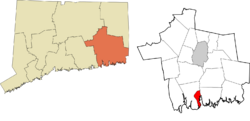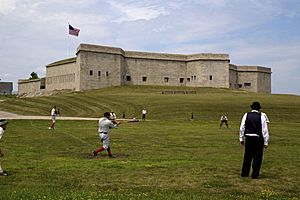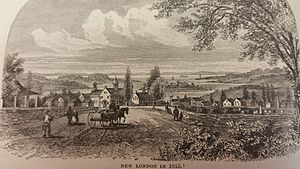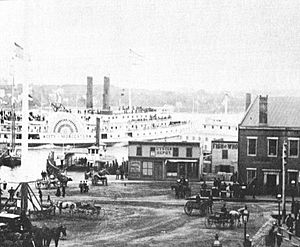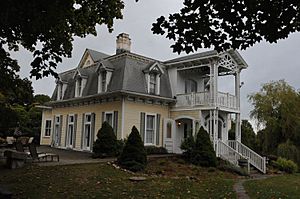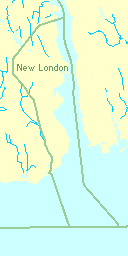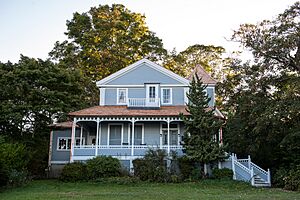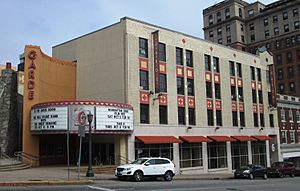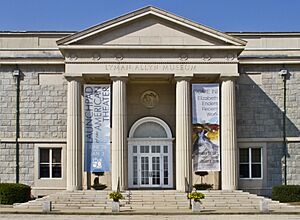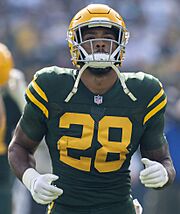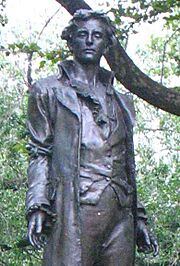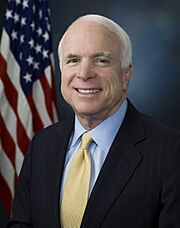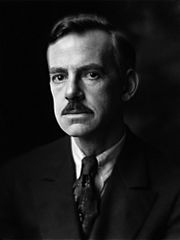New London, Connecticut facts for kids
Quick facts for kids
New London
|
||
|---|---|---|
| City of New London | ||
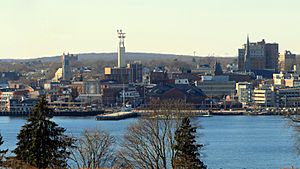
New London skyline from Fort Griswold
|
||
|
||
| Nickname(s):
The Whaling City
|
||
| Motto(s):
Mare Liberum
|
||
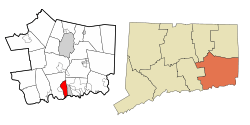 New London County and Connecticut New London County and Connecticut |
||
| Country | United States | |
| U.S. state | Connecticut | |
| County | New London | |
| Region | Southeastern CT | |
| Settled | 1646 (Pequot Plantation) | |
| Named | 1658 (New London) | |
| Incorporated (city) | 1784 | |
| Named for | London, England | |
| Government | ||
| • Type | Mayor–council | |
| Area | ||
| • City | 10.60 sq mi (27.43 km2) | |
| • Land | 5.61 sq mi (14.52 km2) | |
| • Water | 4.98 sq mi (12.91 km2) | |
| • Urban | 123.03 sq mi (318.66 km2) | |
| Elevation | 56 ft (17 m) | |
| Population
(2020)
|
||
| • City | 27,367 | |
| • Density | 4,868/sq mi (1,879.6/km2) | |
| • Metro | 274,055 | |
| Time zone | UTC−5 (EST) | |
| • Summer (DST) | UTC−4 (EDT) | |
| ZIP Code |
06320
|
|
| Area code(s) | 860/959 | |
| FIPS code | 09-52280 | |
| GNIS feature ID | 0209237 | |
| Airport | Groton–New London Airport | |
| Interstates | ||
| U.S. Highways | ||
| State Routes | ||
| Commuter rail | ||
New London is a seaport city on the northeast coast of the United States. It is located where the Thames River meets Long Island Sound. New London is part of the Southeastern Connecticut Planning Region.
The city is home to important schools like the United States Coast Guard Academy, Connecticut College, and Mitchell College. The Coast Guard Station New London is a home port for Coast Guard ships. In 2020, New London had a population of 27,367 people. The larger metropolitan area, including nearby Norwich, has about 274,055 people.
Contents
History of New London
Early Settlement and Naming
The area was first called Nameaug by the Pequot Indians. In 1646, John Winthrop, Jr. started the first English settlement here. This made it one of the earliest towns in Connecticut.
For a while, people called it Nameaug or Pequot. In the 1650s, the settlers wanted to name the town London, after London, England. However, the Connecticut General Assembly wanted to call it Faire Harbour. The citizens insisted on London, and finally, on March 10, 1658, it was officially named New London.
New London in the American Revolution
New London's harbor was very important during the Revolutionary War. It was a key base for American naval operations. Many famous people from New London, like Nathan Hale, played a role in the Revolution.
On September 6, 1781, New London was attacked and burned by Benedict Arnold. Arnold, who was from nearby Norwich, had switched sides to the British. He wanted to destroy American ships and supplies in the city. This attack was also meant to distract General Washington from his march towards Yorktown.
The main defense for New London was Fort Griswold, located across the Thames River in Groton. Arnold knew the fort's secrets and shared them with the British. After taking New London's Fort Trumbull, the British attacked Fort Griswold. The American defenders fought bravely, but the British eventually took the fort.
In January 1784, New London became one of the first two cities in Connecticut to be officially incorporated, along with New Haven.
The 19th Century and Whaling
During the War of 1812, new weapons like torpedoes were used in attempts to protect American harbors. A submarine even tried to use a torpedo against a British ship in New London's harbor!
For many years in the early 1800s, New London was one of the world's busiest whaling ports. Only Nantucket and New Bedford, Massachusetts were busier. The money earned from whaling helped build many of the beautiful buildings you can still see in the city today.
Later, railroads connected New London to other cities. The New Haven and New London Railroad arrived in the 1850s. The Springfield and New London Railroad connected the city to Springfield, Massachusetts by the 1870s.
Military History
New London has a long military history. It is home to the United States Coast Guard Academy and Coast Guard Station New London. Many military sites have been at Fort Trumbull. The first Fort Trumbull was built during the Revolutionary War. The second, which still stands, was built between 1839 and 1852.
In the early 1900s, Fort Trumbull became a training school for the United States Revenue Cutter Service. This service later became part of the United States Coast Guard in 1915. The Academy moved to its current location in 1932.
During World War II, a training school for Merchant Marine officers was at Fort Trumbull. From 1950 to 1990, the Naval Underwater Sound Laboratory was there. This lab developed sonar systems for US Navy submarines.
The Naval Submarine Base New London is actually in Groton, but submarines were based in New London from 1951 to 1991.
Eugene O'Neill's Connection
The famous playwright Eugene O'Neill (1888-1953) had strong ties to New London. He lived here for many years and wrote some of his first plays in the city. You can find many of his writings at Connecticut College. His family home, Monte Cristo Cottage, is now a museum and a national historic landmark.
Geography and Location
New London is one of the smallest cities in Connecticut by land area. About half of its total area is water.
Over time, parts of the original town of New London were used to form new towns. These include Groton, Ledyard, Montville, and Waterford.
New London is bordered by Waterford to the west and north. The Thames River and Groton are to the east. To the south is Long Island Sound.
Main Areas
- Downtown
- Ocean Beach
Other smaller areas include Fort Trumbull, Glenwood Park, and Mitchell's Woods.
Climate and Weather
New London has a climate that is a mix of humid continental and humid subtropical. This means it has warm summers and cool winters. The city gets a lot of sunshine, about 2,600 hours each year. It is also the mildest large city in Connecticut during winter.
In summer, the weather is often hot and humid. Thunderstorms can happen, bringing heavy but short rain. Spring and fall are mild, with temperatures usually between 55 and 70 degrees Fahrenheit. Because it's by the sea, New London has a long growing season. The first frost usually doesn't happen until early November.
Winters are cool to cold, with a mix of rain and snow. New London typically has snow on the ground for less than 25 days a year. The temperature difference between the coast and inland areas can be quite large in winter.
Sometimes, tropical storms or hurricanes hit the Connecticut coast, including New London. Some notable ones were Hurricane Carol (1954), Hurricane Donna (1960), and Hurricane Gloria (1985). Tropical Storm Irene (2011) and Hurricane Sandy (2012) also caused some damage.
New London's coastal location allows certain plants to grow that usually prefer warmer climates. These include Southern Magnolias and palm trees. The growing season is long, lasting about 210 days from April to November.
| Climate data for Groton–New London Airport (GON) (1981-2010), snow data from Norwich, Connecticut (1981-2010). | |||||||||||||
|---|---|---|---|---|---|---|---|---|---|---|---|---|---|
| Month | Jan | Feb | Mar | Apr | May | Jun | Jul | Aug | Sep | Oct | Nov | Dec | Year |
| Record high °F (°C) | 65 (18) |
67 (19) |
78 (26) |
88 (31) |
91 (33) |
95 (35) |
101 (38) |
99 (37) |
93 (34) |
83 (28) |
75 (24) |
69 (21) |
101 (38) |
| Mean daily maximum °F (°C) | 37.5 (3.1) |
40 (4) |
46.5 (8.1) |
55.4 (13.0) |
64.5 (18.1) |
73.3 (22.9) |
78.2 (25.7) |
78.4 (25.8) |
72.3 (22.4) |
61.5 (16.4) |
53 (12) |
42.4 (5.8) |
58.6 (14.8) |
| Daily mean °F (°C) | 29.5 (−1.4) |
32 (0) |
37.8 (3.2) |
47 (8) |
56 (13) |
65.4 (18.6) |
70.6 (21.4) |
70.4 (21.3) |
63.7 (17.6) |
52.7 (11.5) |
44.5 (6.9) |
34.7 (1.5) |
50.4 (10.1) |
| Mean daily minimum °F (°C) | 21.6 (−5.8) |
23.9 (−4.5) |
29.1 (−1.6) |
38.7 (3.7) |
47.6 (8.7) |
57.6 (14.2) |
62.9 (17.2) |
62.3 (16.8) |
55.1 (12.8) |
43.9 (6.6) |
35.9 (2.2) |
27 (−3) |
42.1 (5.6) |
| Record low °F (°C) | −14 (−26) |
−12 (−24) |
0 (−18) |
14 (−10) |
30 (−1) |
38 (3) |
47 (8) |
41 (5) |
29 (−2) |
22 (−6) |
8 (−13) |
−10 (−23) |
−14 (−26) |
| Average precipitation inches (mm) | 3.27 (83) |
2.86 (73) |
4.16 (106) |
4.41 (112) |
3.85 (98) |
4.11 (104) |
3.77 (96) |
4.16 (106) |
4 (100) |
3.86 (98) |
4.31 (109) |
3.73 (95) |
46.49 (1,180) |
| Average snowfall inches (cm) | 8.8 (22) |
8.0 (20) |
3.6 (9.1) |
0.8 (2.0) |
0 (0) |
0 (0) |
0 (0) |
0 (0) |
0 (0) |
0 (0) |
0.2 (0.51) |
6.6 (17) |
28 (70.61) |
| Average precipitation days (≥ 0.05) | 6 | 5 | 6 | 7 | 8 | 8 | 6 | 6 | 6 | 7 | 7 | 7 | 79 |
| Average snowy days (≥ 0.05) | 3 | 3 | 2 | 0 | 0 | 0 | 0 | 0 | 0 | 0 | 0 | 2 | 10 |
| Source: | |||||||||||||
People of New London
Population and Backgrounds
In 2020, New London had 27,374 people. The population density was about 4,868 people per square mile.
The city's population is diverse. In 2020, about 56.2% of people were White, 29.4% were Hispanic or Latino, and 17.0% were African American. About 2.3% were Asian, and 10.8% were from two or more races.
The average household size was 2.12 people. About 23.7% of households had children under 18. The median age in the city was 35.5 years.
The median income for a household in New London was $56,237. About 21.5% of the population lived below the poverty line.
Economy and Jobs
New London was once one of the world's top three whaling ports. The money from whaling helped build much of the city's architecture. Over time, many of its older industries declined.
Today, the State Pier in New London is being updated to support offshore wind power projects. This is bringing new economic opportunities to the city.
Arts and Culture
Eugene O'Neill's Legacy
The famous playwright Eugene O'Neill (1888–1953) lived in New London and wrote many plays here. His family home, Monte Cristo Cottage, is now a museum. It is managed by the Eugene O'Neill Theater Center.
Music in New London
New London is home to several musical groups:
- The Eastern Connecticut Symphony Orchestra, started in 1946.
- The Idlers of the United States Coast Guard Academy, a singing group known for sea shanties.
- The United States Coast Guard Band, founded in 1925. This band performs across the country.
Places to Visit
New London has many interesting places to visit:
- Lyman Allyn Art Museum
- Ocean Beach Park
- New London Maritime Society, U.S. Custom House (where the Amistad ship landed)
- Connecticut College Arboretum (a beautiful plant collection)
- Fort Griswold (in Groton, a historic fort)
- Fort Trumbull (another historic fort)
- United States Coast Guard Academy
- Garde Arts Center (a historic theater)
- Joshua Hempsted House (a very old house from 1678)
- Monte Cristo Cottage & Eugene O'Neill Theater Center (in Waterford)
- USS Nautilus (in Groton, the world's first nuclear submarine)
- Ye Antientist Burial Ground (an old cemetery)
- Winthrop Mill (a mill from 1650)
Getting Around New London
New London has several ways to get around.
- Buses: Local buses are provided by Southeast Area Transit and Estuary Transit District. You can also take Greyhound Lines buses for longer trips.
- Highways: Interstate 95 runs through New London.
- Trains: New London Union Station serves Amtrak and Shore Line East commuter trains. Freight trains also use the tracks.
- Ferries: You can take ferries to Long Island, Fishers Island, and Block Island. Cruise ships also visit New London.
- Airport: The Groton-New London Airport is nearby in Groton. Larger commercial flights are available from T. F. Green Airport and Tweed New Haven Regional Airport.
Famous People from New London
- Theresa Andrews (born 1962), Olympic gold medalist in swimming
- A. J. Dillon (born 1998), American football running back
- Kris Dunn (born 1994), professional basketball player
- Elsie Ferguson (1883–1961), stage and film actress
- Nathan Hale (1755–1776), American patriot during the Revolution
- Glenne Headly (1955–2017), actress
- John McCain (1936–2018), U.S. Senator and presidential candidate (lived here as a child)
- Gaten Matarazzo (born 2002), actor
- Casey Neistat (born 1981), filmmaker
- Eugene O'Neill (1888–1953), famous playwright
- Jordan Reed (born 1990), American football tight end
- Samuel Seabury (1729–1796), first American Episcopal bishop
- Cassie Ventura (born 1986), singer
- John Winthrop the Younger (1606–1676), founder of New London
Mayors of New London
Here are some notable people who have served as mayor of New London:
- Richard Law (1784–1806)
- Elias Perkins (1829–1832)
- Noyes Billings (1835–1837)
- John Perkins Cushing Mather (1845–1850)
- Hiram Willey (1862–1865)
- Augustus Brandegee (1871–1873)
- Thomas M. Waller (1873–1879)
- Bryan F. Mahan (1903–1909, 1909-1915)
- Ernest E. Rogers (1915–1918)
See also
 In Spanish: New London (Connecticut) para niños
In Spanish: New London (Connecticut) para niños
 | Anna J. Cooper |
 | Mary McLeod Bethune |
 | Lillie Mae Bradford |



